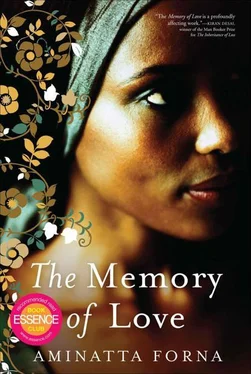Saffia continued to live in the pink house on the hill with the crone aunt, who came and went between the city and the village. The aunt was a woman, as I think I have indicated, from whom a low-level hostility emanated at all times, who seemed possessed of an infinite capacity for hate. She hated the city people, who were full of themselves. She hated non-believers, but Christians more, because she also distrusted them. She hated the poor, the weak, the sick and the needy. In particular she reviled all members of her own sex. Her attitude to men was somewhat more complicated, for it encompassed both her natural loathing of her fellow man and her sycophancy towards those in possession of some degree of power. That she had disliked me and regarded my visits to the house with suspicion, I knew.
Between Saffia and the aunt there had always been a certain amount of bickering. Her aunt was straight from the rice fields. It was unsurprising, therefore, that Saffia might be easily irritated by an elder full of village superstitions. Balance in matters of social hierarchy, however, is infinitely delicate, accounted for by so many things: family, age, wealth.
The shift in the aunt’s manner towards Saffia following Julius’s death amounted to relatively little. She was merely, one might say, altogether less careful. Her tone of voice became sharper, her demands more frequent and petty. She seemed to feel Saffia was there to do her bidding. What had wrought it was this: whilst the aunt was the elder, and as such merited a high degree of deference, it was Saffia who had been married to a big man — this in the aunt’s view, of course — who lived in a grander house than I am certain the aunt had ever previously set foot in.
Now Julius was gone and Saffia no longer married to a big man.
The woman opposite, a coarse-mouthed fish seller, seemed to have found a new vocation in watching the comings and goings at the pink house, a fact she made no effort to conceal. There were occasions I had waited under her gaze, listened to her remark upon my visit to unseen listeners. I never once saw her husband. Doubtless he was barred from the verandah, for fear he might be drawn to the newly available temptations in the house opposite. Not that the fish mammy’s concerns were baseless. A woman alone does indeed attract the attention of men, who scent her vulnerability. It bothered me to think of who might try to take advantage of Saffia’s situation. Once I found the dancer fellow up there, ostensibly offering condolences. I sat down opposite and glared at him until he left.
However, it became interesting to observe the shift in the aunt’s manner towards me now that she was in the business of encouraging a protector for her niece. As I have indicated, she was the type of woman who adjusted swiftly to any change in the status quo. One evening I encountered her as she returned from the mosque. I raised my hat and greeted her in my most respectful tone. ‘Good evening, Auntie.’ It stopped her in her tracks and, once she had assured herself I wasn’t mocking her in any way, I saw a small smirk of pleasure at being thus addressed. It amused me to think of her as my new-found ally.
It was the aunt who brought it to my attention that the two of them were struggling to pay the rent. Julius had been far too young to leave a pension. Through my efforts and by applying some leverage upon the Dean who sat upon the relevant committee, I managed to secure for Saffia a small grant to cover her work cataloguing the flora that grew in the university grounds. Not so much she could rely upon it indefinitely. The amount of the grant would give her enough to live for exactly a year.
Throughout those months I worked towards a single goal. I threw my energy into research for a paper on the creation of the Native Affairs Department. If I had once been a merely conscientious academic, I was driven now. It is astonishing, the effect of hope. I was working towards a future now, one that included Saffia.
In the morning I dealt with my correspondence and planned my lectures. That lasted until midday. I took lunch in the cafeteria. In the afternoon I went to the library and worked my way through the bound minutes of the Aborigines and Native Affairs Department, pencilling notes in my notebook as I went. Thoughts of Saffia came between me and the letters of the government agent Thomas George Lawson, his fearsome Protestantism and loyalty to the Crown. At about four o’clock I concluded my travels with Lawson on his trips into the interior to settle scores between the chiefs, gathered my papers and deposited them in my office.
The state of nervous anticipation in which I spent my days peaked at about half past four, when I went to see Saffia. Most days I had a reason, for as I think I have told you, I sought to make myself useful to her in as many ways as possible. I dealt with the university bureaucracy, gave her financial advice and moreover attended to many other minor household matters as well. In the months after Julius died I watched as the weight fell away from Saffia’s body. Saw how the lines on either side of her mouth refused to fade. Observed from the wandering of her eye her inability to concentrate. From the slight, irrelevant smile with which she thanked me I knew how much pain she suffered. I also knew she would survive. For in the end, people always do.
Stay. Wait. Patience.
An evening we walked in the garden. The idea had been mine. Saffia looked like she was about to decline, but then changed her mind and led the way down the stairs. It was still light, the dense rain clouds had lifted, there was even a little blue in the sky. The garden was looking somewhat neglected. The Harmattan lilies were bent and broken, like soldiers after a battle, many were strewn in tangles upon the ground, their once lovely heads had shrivelled away, the petals darkened and torn. I remember the occasion because it was perhaps the only time she spoke to me of Julius directly, though she often mentioned him in passing.
‘I still miss him, Elias,’ she said.
‘I know,’ I replied. ‘I miss him, too.’ In a way it was true. Julius had left a space in my life. I had not known a great many friendships.
Saffia sighed. ‘Perhaps if we’d had a child. But Julius wanted me to finish my studies.’
‘There’s still time,’ I said. ‘You’re young.’ It is the stock response, people say such things to widows all the time. I had spoken without thinking.
But she merely replied, ‘Yes.’
One word. Yet so much more. She had said yes. Agreed her life was not over. I looked at her. I was consumed by a feeling of inexpressible joy. Only later did I recognise it for what it was. Hope. For in that instant the beauty and pain of the past, the unbearable present and the possible future all ran together.
In most other respects life had returned to a kind of normality. I saw Yansaneh once on the campus, I think. He seemed to be keeping his head down. No word from Kekura. Nor did I hear from Johnson again. The Dean seemed in reasonable spirits. A lot of universities in our country and elsewhere were closing their humanities departments or else having their grants cut. Liberal arts were the first to be hit in times of economic stress. The government argued certain skills were more in demand than others. Philosophy, literature, drama — such subjects were a luxury, a frivolity even, in times of need. So far the Dean had proved himself a powerful negotiator in these matters and had somehow managed to save our department the same fate. As the months wore on, Julius, his death, my own arrest — these events seemed to recede into the past.
One unpleasant occurrence. A visit from Vanessa.
It was Saturday when she turned up at the apartment. I could scarcely remember when I had last seen her. At any rate, she hadn’t changed, though her look had been updated. I heard later she had a new boyfriend. She wore a large Afro wig and a pair of tight trousers. I have never cared for the look of trousers on a woman. It was hard not to make comparisons with Saffia and I wonder if Vanessa didn’t sense my appraisal, for she leant against the kitchen counter and eyed me challengingly.
Читать дальше












